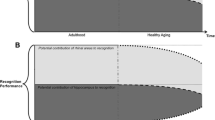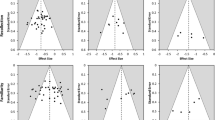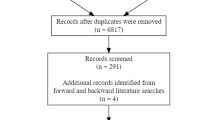Abstract
Difficulty recognizing previously encountered stimuli is one of the earliest signs of incipient Alzheimer's disease (AD). Work over the last 10 years has focused on how patients with AD and those in the prodromal stage of amnestic mild cognitive impairment make recognition decisions for visual and verbal stimuli. Interestingly, both groups of patients demonstrate markedly better memory for pictures over words, to a degree that is significantly greater in magnitude than their healthy older counterparts. Understanding this phenomenon not only helps to conceptualize how memory breaks down in AD, but also potentially provides the basis for future interventions. This review critically examines recent recognition memory work using pictures and words in the context of the dual-process theory of recognition and current hypotheses of cognitive breakdown in the course of very early AD.
Similar content being viewed by others
References
Papers of particular interest, published recently, have been highlighted as: • Of importance •• Of major importance
Brookmeyer R, Johnson E, Ziegler-Graham K, Arrighi HM. Forecasting the global burden of Alzheimer's disease. Alzheimer’s Dement. 2007;3:186–91.
Andel R, Hyer K, Slack A. Risk factors for nursing home placement in older adults with and without dementia. J Aging Health. 2007;19:213–28.
Clipp E. US Department of Veteran’s Affairs HSR&D study NRI 95-218, informal caregivers of veterans and dementia: cost, QOL, and service use. 2005.
Ally BA, Gold CA, Budson AE. The picture superiority effect in patients with Alzheimer's disease and mild cognitive impairment. Neuropsychologia. 2009;47:595–8.
•• Embree LM, Budson AE, Ally BA. Memorial familiarity remains intact for pictures but not for words in amnestic mild cognitive impairment. Neuropsychologia. 2012;50:2333–40. For nearly 5 years, there has been debate in the literature as to whether memorial familiarity remains intact in patients with aMCI. Conflicting evidence appeared to be resolved when stimulus type was taken into consideration. This study provided convincing evidence that familiarity remains intact for pictures but not for words in patients with aMCI. Further, this study also provided solid evidence that the picture superiority effect is greater in magnitude than in healthy older adults.
Yonelinas AP. The nature of recollection and familiarity: a review of 30 years of research. J Mem Lang. 2002;46:441–517.
Hyman BT, Van Horsen GW, Damasio AR, Barnes CL. Alzheimer’s disease: cell-specific pathology isolates the hippocampal formation. Science. 1984;225:1168–70.
Braak H, Braak E. Neuropathological stageing of Alzheimer-related changes. Acta Neuropathol. 1991;82:239–59.
Gomez-Isla T, West HL, Rebeck GW, et al. Clinical and pathological correlates of apolipoprotein E epsilon 4 in Alzheimer's disease. Ann Neurol. 1996;39:62–70.
Mesulam MM. A plasticity-based theory of the pathogenesis of Alzheimer's disease. Ann N Y Acad Sci. 2000;924:42–52.
Simons JS, Owen AM, Fletcher PC, Burgess PW. Anterior prefrontal cortex and the recollection of contextual information. Neuropsychologia. 2005;43:1774–83.
Ally BA, Simons JS, McKeever JD, Peers PV, Budson AE. Parietal contributions to recollection: electrophysiological evidence from aging and patients with parietal lesions. Neuropsychologia. 2008;46:1800–12.
Eichenbaum H, Yonelinas AP, Ranganath C. The medial temporal lobe and recognition memory. Annu Rev Neurosci. 2007;30:123–52.
Ally BA, Gold CA, Budson AE. An evaluation of recollection and familiarity in Alzheimer's disease and mild cognitive impairment using receiver operating characteristics. Brain Cogn. 2009;69:504–13.
Ally BA, McKeever JD, Waring JD, Budson AE. Preserved frontal memorial processing for pictures in patients with mild cognitive impairment. Neuropsychologia. 2009;47:2044–55.
Wolk DA, Signoff ED, DeKosky ST. Recollection and familiarity in amnestic mild cognitive impairment: a global decline in recognition memory. Neuropsychologia. 2008;46:1965–78.
Skinner EI, Fernandes MA. Neural correlated of recollection and familiarity: a review of neuroimaging and patient data. Neuropsychologia. 2007;45:2163–79.
Brown MW, Aggleton JP. Recognition memory: what are the roles of the perirhinal cortex and hippocampus. Nat Rev Neurosci. 2001;2:51–61.
Henson RN, Cansino S, Herron JE, Robb WG, Rugg MD. A familiarity signal in human anterior medial temporal cortex? Hippocampus. 2003;13:301–4.
Gilboa A, Winocur G, Rosenbaum RS, et al. Hippocampal contributions to recollection in retrograde and anterograde amnesia. Hippocampus. 2006;16:966–80.
Vann SD, Tsivilis D, Denby CE, et al. Impaired recollection but spared familiarity in patients with extended hippocampal system damage revealed by 3 convergent methods. Proc Natl Acad Sci USA. 2009;31:5442–7.
Yonelinas AP, Kroll NE, Dobbins I, Lazzara M, Knight RT. Recollection and familiarity deficits in amnesia: convergence of remember-know, process dissociation, and receiver operating characteristic data. Neuropsychology. 1998;12:323–39.
Aly M, Yonelinas AP, Kishiyama MM, Knight RT. Damage to the lateral prefrontal cortex impairs familiarity but not recollection. Behav Brain Res. 2011;225:297–304.
Montaldi D, Spencer TJ, Roberts N, Mayes AR. The neural system that mediates familiarity memory. Hippocampus. 2006;16:504–20.
Algarabel S, Escudero J, Mazon JF, et al. Familiarity-based recognition in the young, healthy elderly, mild cognitive impaired, and Alzheimer's patients. Neuropsychologia. 2009;47:2056–64.
Anderson ND, Ebert PL, Jennings JM, et al. Recollection- and familiarity-based memory in healthy aging and amnestic mild cognitive impairment. Neuropsychology. 2008;22:177–87.
Hudon C, Belleville S, Gauthier S. The assessment of recognition memory using the remember/know procedure in amnestic mild cognitive impairment and probable Alzheimer's disease. Brain Cogn. 2009;70:171–9.
O'Connor MK, Ally BA. Using stimulus form change to understand memorial familiarity for pictures and words in patients with mild cognitive impairment and Alzheimer's disease. Neuropsychologia. 2010;48:2068–74.
Serra L, Bozzali M, Cercignani M, et al. Recollection and familiarity in mold cognitive impairment. Neuropsychology. 2010;24:316–26.
Westerberg CE, Paller KA, Weintraub S, et al. When memory does not fail: familiarity-based recognition in mild cognitive impairment and Alzheimer's disease. Neuropsychology. 2006;20:193–205.
Gallo DA, Shahid KR, Olson MA, et al. Overdependence on degraded gist memory in Alzheimer's disease. Neuropsychology. 2006;20:625–32.
Pierce BH, Sullivan AL, Schacter DL, Budson AE. Comparing source-based and gist-based false recognition in aging and Alzheimer's disease. Neuropsychology. 2005;19:411–9.
Gold CA, Budson AE. Memory loss in Alzheimer's disease: implications for development of therapeutics. Expert Rev Neurother. 2008;8:1879–91.
Mitchell JP, Sullivan AL, Schacter DL, Budson AE. Misattribution errors in Alzheimer's disease: the illusory truth effect. Neuropsychology. 2006;20:185–92.
Budson AE, Wolk DA, Chong H, Waring JD. Episodic memory in Alzheimer's disease: separating response bias from discrimination. Neuropsychologia. 2006;44:2222–32.
Deason RG, Hussey EP, Ally BA, Budson AE. Changes in response bias with different study-test delays: evidence from young adults, older adults, and patients with Alzheimer’s disease. Neuropsychology. 2012;1:119–26.
Gallo DA, Sullivan AL, Daffner KR, Schacter DL, Budson AE. Associative recognition in Alzheimer's disease: evidence for impaired recall-to-reject. Neuropsychology. 2004;18:556–63.
Henson RN, Shallice T, Dolan RJ. Right prefrontal cortex and episodic memory retrieval: a functional MRI test of the monitoring hypothesis. Brain. 1999;122:1367–81.
Hayama HR, Johnson JD, Rugg MD. The relationship between the right frontal old/new ERP effect and post-retrieval monitoring: specific or non-specific? Neuropsychologia. 2008;46:1211–23.
Allan K, Wilding EL, Rugg MD. Electrophysiological evidence for dissociable processes contributing to recollection. Acta Psychol. 1998;98:231–52.
Wilding EL, Rugg MD. An event-related potential study of recognition memory with and without retrieval of source. Brain. 1996;119:889–905.
Shallice T, Fletcher P, Frith CD, et al. Brain regions associated with acquisition and retrieval of verbal episodic memory. Nature. 1994;368:633–5.
Budson AE, Michalska KJ, Sullivan AL, et al. False recognition in Alzheimer's disease: evidence from categorized pictures. Cogn Behav Neurol. 2003;16:16–27.
Dodson CS, Spaniol M, O’Connor MK, et al. Alzheimer’s disease and memory-monitoring impairment: Alzheimer’s patients show a monitoring deficit that is greater than their accuracy deficit. Neuropsychologia. 2011;49:2609–18.
Schwindt GC, Black SE. Functional imaging studies of episodic memory in Alzheimer's disease: a quantitative meta-analysis. NeuroImage. 2009;45:181–90.
Sperling RA, Dickerson BC, Pihlajamaki M, et al. Functional alterations in memory networks in early Alzheimer's disease. Neuromolecular Med. 2010;12:27–43.
Gallo DA, Chen JM, Wiseman AL, Schacter DL, Budson AE. Retrieval monitoring and anosognosia in Alzheimer's disease: evidence from the criterial recollection task. Neuropsychology. 2007;21:559–68.
Wolk DA, Schacter DL, Berman AR, et al. Patients with Alzheimer's disease attribute conceptual fluency to prior experience. Neuropsychologia. 2005;43:1662–72.
Budson AE, Dodson CS, Daffner KR, Schacter DL. Metacognition and false recognition in Alzheimer's disease: further exploration of the distinctiveness heuristic. Neuropsychology. 2005;19:253–8.
Waring JD, Chong H, Wolk DA, Budson AE. Preserved metamemorial ability in patients with mild Alzheimer’s disease: shifting response bias. Brain Cogn. 2008;66:32–9.
Zhang Y, Han B, Verhaeghen P, Nilsson LG. Executive functioning in older adults with mild cognitive impairment: MCI has effects on planning, but not on inhibition. Neuropsychol Dev Cogn B Aging Neuropsychol Cogn. 2007;14:557–70.
Bisiacchi PS, Borella E, Bergamaschi S, Carretti B, Mondini S. Interplay between memory and executive functions in normal and pathological aging. J Clin Exp Neuropsychol. 2008;30:723–33.
Hildebrandt H, Haldenwanger A, Eling P. False recognition helps to distinguish patients with Alzheimer's disease and amnestic MCI from patients with other kinds of dementia. Dement Geriatr Cogn Disord. 2009;28:159–67.
Zhang F, Geng H. What can false memory tell us about memory impairments in Alzheimer's disease? Chin Sci Bull. 2010;35:3989–97.
Paivio A. Imagery and verbal processes. New York: Holt, Rinehart, and Winston; 1971.
Nelson DL, Reed US, Walling JR. Picture superiority effect. J Exp Psychol Hum Learn Mem. 1976;2:523–8.
Weldon MS, Roediger 3rd HL. Altering retrieval demands reverses the picture superiority effect. Mem Cognit. 1987;15:269–80.
Weldon MS, Roediger 3rd HL, Challis BH. The properties of retrieval cues constrain the picture superiority effect. Mem Cognit. 1989;17:95–105.
Ally BA, Budson AE. The worth of pictures: using high density event-related potentials to understand the memorial power of pictures and the dynamics of recognition memory. NeuroImage. 2007;35:378–95.
Ally BA, Waring JD, Beth EH, et al. Aging memory for pictures: using high-density event-related potentials to understand the effect of aging on the picture superiority effect. Neuropsychologia. 2008;46:287–97.
Curran T, Doyle J. Picture superiority doubly dissociates the ERP correlates of recollection and familiarity. J Cogn Neurosci. 2011;23:1247–62.
Rajaram S. Perceptual effects on remembering: recollective processes in picture recognition memory. J Exp Psychol Learn Mem Cogn. 1996;22:365–77.
Hamilton M, Geraci L. The picture superiority effect in conceptual implicit memory: a conceptual distinctiveness hypothesis. Am J Psychol. 2006;119:1–20.
Rajaram S, Geraci L. Conceptual fluency selectively influences knowing. J Exp Psychol Learn Mem Cogn. 2000;26:1070–4.
Whittlesea BWA, Williams LD. Why do strangers feel familiar, but friends don't? A discrepancy-attribution account of feelings of familiarity. Acta Psychol. 1998;98:141–65.
Jacoby LL, Whitehouse K. An illusion of memory: false recognition influenced by unconscious perception. J Exp Psychol Gen. 1989;118:126–35.
Lindsay DS, Kelley CM. Creating illusions of familiarity in a cued recall remember/know paradigm. J Mem Lang. 1996;35:197–211.
Roediger HL, McDermott KB. Creating false memories: remembering words not presented in lists. J Exp Psychol Learn Mem Cogn. 1995;21:803–14.
Ballesteros S, Reales JM, Mayas J. Picture priming in normal aging and Alzheimer's disease. Psicothema. 2007;19:239–44.
Fleischman DA, Wilson RS, Gabrieli JD, et al. Implicit memory and Alzheimer's disease neuropathology. Brain. 2005;128:2006–15.
Willems S, Salmon E, Van der Linden M. Implicit/explicit memory dissociation in Alzheimer's disease: the consequence of inappropriate processing? Neuropsychology. 2008;22:710–7.
Yonelinas AP, Hopfinger JB, Buonocore MH, Kroll NE, Baynes K. Hippocampal, parahippocampal and occipital-temporal contributions to associative and item recognition memory: an fMRI study. Neuroreport. 2001;12:359–63.
Golby A, Silverberg G, Race E, et al. Memory encoding in Alzheimer's disease: an fMRI study of explicit and implicit memory. Brain. 2005;128:773–87.
Koenig P, Smith EE, Troiani V, et al. Medial temporal lobe involvement in an implicit memory task: evidence of collaborating implicit and explicit memory systems from fMRI and Alzheimer's disease. Cereb Cortex. 2008;18:2831–43.
Quiroz YT, Ally BA, Celone K, et al. Event-related potential markers of brain changes in preclinical familial Alzheimer's disease. Neurology. 2011;77:469–75.
Troller JN, Sachdev PS, Haindl W, et al. A high-resolution single photon emission computer tomography study of verbal recognition memory in Alzheimer's disease. Dement Geriatr Cogn Disord. 2006;21:267–74.
Fleischman DA, Gabrieli JD. Repetition priming in normal aging and Alzheimer's disease: a review of findings and theories. Psychol Aging. 1998;13:88–119.
Deason RG, Hussey EP, Budson AE, Ally BA. Gist-based conceptual processing of pictures remains intact in patients with amnestic mild cognitive impairment. Neuropsychology. 2012;2:202–8.
Martins CA, Lloyd-Jones TJ. Preserved conceptual priming in Alzheimer's disease. Cortex. 2006;42:995–1004.
Goudour A, Samson S, Bakchine S, Ehrle N. Agnosic or semantic impairment in very mild Alzheimer's disease? Neuropsychol Dev Cogn B Aging Neuropsychol Cogn. 2011;18:230–53.
• Price SE, Kinsella GJ, Ong B, et al. Semantic verbal fluency strategies in amnestic mild cognitive impairment. Neuropsychology. 2012;26:490–7. This study used multiple methods to examine cognitive strategies in semantic fluency in patients with aMCI. Patients not only had worse overall performance on the fluency task, but they also produced smaller semantic cluster sizes and fewer subcategories of items. Further, patients with aMCI had an overall reduction in word production. These results demonstrate the aberrant spread within the semantic network that likely underlies diminished conceptual processing of words in these patients.
Wierenga CE, Stricker NH, McCauley A, et al. Altered brain response for semantic knowledge in Alzheimer's disease. Neuropsychologia. 2011;49:392–404.
Chertkow H, Bub D. Semantic memory loss in dementia of Alzheimer's type. What do various measures measure? Brain. 1990;113:397–417.
Hussey EP, Smolinsky JG, Piryatinsky I, Budson AE, Ally BA. Using mental imagery to improve memory in patients with Alzheimer disease: trouble generating or remembering the mind's eye? Alzheimer Dis Assoc Disord. 2012;26:124–34.
Budson AE, Sitarski J, Daffner KR, Schacter DL. False recognition of pictures versus words in Alzheimer's disease: the distinctiveness heuristic. Neuropsychology. 2002;16:163–73.
Beth EH, Budson AE, Waring JD, Ally BA. Response bias for picture recognition in patients with Alzheimer disease. Cogn Behav Neurol. 2009;22:229–35.
Dierckx E, Engelborghs S, De Raedt R, et al. Verbal cued recall as a predictor of conversion to Alzheimer's disease in mild cognitive impairment. Int J Geriatr Psychiatry. 2009;24:1094–100.
Greenaway MC, Duncan NL, Smith GE. The memory support system for mild cognitive impairment: randomized trial of a cognitive rehabilitation intervention. Int J Geriatr Psychiatry. 2012. doi:10.1002/gps.3838.
Sugano K, Yokogawa M, Yuki S, et al. Effect of cognitive and aerobic training intervention on older adults with mild or no cognitive impairment: a derivative study of the Nakajima project. Dement Geriatr Cogn Dis Extra. 2012;2:69–80.
Macduffie KE, Atkins AS, Flegal KE, Clark CM, Reuter-Lorenz PA. Memory distortion in Alzheimer's disease: deficient monitoring of short- and long-term memory. Neuropsychology. 2012;26:509–16.
Noonan KA, Pryer LR, Jones RW, Burns AS, Lambon Ralph MA. A direct comparison of errorless and errorful therapy for object name relearning in Alzheimer's disease. Neuropsychol Rehabil. 2012;22:215–34.
Clare L, Linden DE, Woods RT, et al. Goal-oriented cognitive rehabilitation for people with early-stage Alzheimer disease: a single-blind randomized controlled trial of clinical efficacy. Am J Geriatr Psychiatry. 2010;18:928–39.
Clare L, Jones RS. Errorless learning in the rehabilitation of memory impairment: a critical review. Neuropsychol Rev. 2008;18:1–23.
Lezak MD, Howieson DB, Loring DW. Memory I: Tests. In: Neuropsychological assessment, Fourth Edition. New York: Oxford University Press; 2004. p. 414-479.
Sanders C, Schmitter-Edgecombe M. Identifying the nature of impairment in planning ability with normal aging. J Clin Exp Neuropsychol. 2012.
• Johns EK, Phillips NA, Belleville S, et al. The profile of executive functioning in amnestic mild cognitive impairment: disproportionate deficits in inhibitory control. J Int Neuropsychol Soc. 2012;18:541–55. This study highlighted the need for more sensitive and detailed measures in clinical assessment. The authors found that 100% of 40 aMCI patients in their data set demonstrated executive dysfunction in at least one of the five established subdomains of executive function, 96% in at least two subdomains, and 43% in all five subdomains. These results are not only important when conceptualizing clinical evaluations, but also raise important questions about the potential implications of executive functioning inefficiencies on memory.
Acknowledgments
This work was supported by NIH grants AG038471 and AG031925.
Disclosure
No potential conflicts of interest relevant to this article were reported.
Author information
Authors and Affiliations
Corresponding author
Rights and permissions
About this article
Cite this article
Ally, B.A. Using Pictures and Words To Understand Recognition Memory Deterioration in Amnestic Mild Cognitive Impairment and Alzheimer's Disease: A Review. Curr Neurol Neurosci Rep 12, 687–694 (2012). https://doi.org/10.1007/s11910-012-0310-7
Published:
Issue Date:
DOI: https://doi.org/10.1007/s11910-012-0310-7




